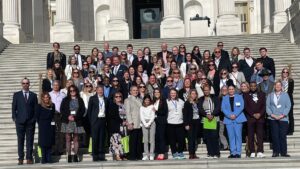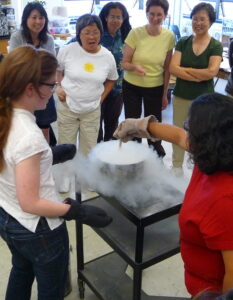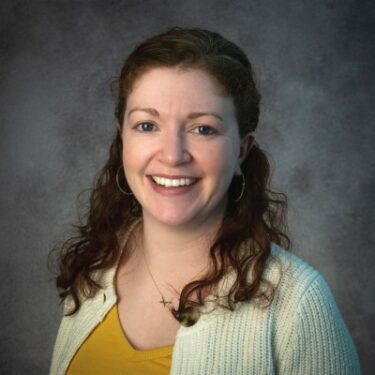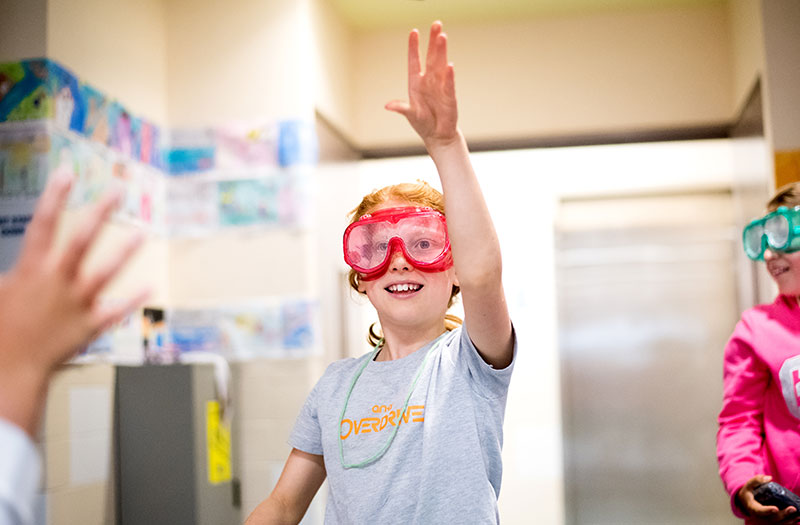Katherine Lontok (she/her/hers) is a Science Communication and Outreach Professional at the Immune Deficiency Foundation in Hanover, Maryland. Previously she was a UCSF volunteer from 2005 to 2010 participating in multiple programs and interning with SEP.
What do you do at the Immune Deficiency Foundation? How long have you been there? I’ve been at the Immune Deficiency Foundation for three years. The foundation is a patient-focused non-profit that improves the diagnosis, treatment, and quality of life for every person affected by primary immunodeficiencies. Primary immunodeficiencies (PIs) are a group of 450+ rare, genetic conditions where part of someone’s immune system is missing or doesn’t work correctly. The most well-known PI is severe combined immunodeficiency (SCID), which is what David Vetter, known as “the boy-in-the-bubble,” had.
At the foundation, I act as a liaison between the Policy and Research teams and the Communications team, which means I tell our community about our policy and research priorities and accomplishments.
What does your day-to-day look like in your current role? Ah, a typical day…I’m usually writing something, most often an article for either our website or newsletter. I approach this like a journalist would, researching the topic I’m writing about and interviewing experts or people with PI to flesh out the story. I also spend a lot of time editing things other people have written; again, mostly articles, but sometimes policy statements or social media posts. There are only two of us on staff with medical/scientific training, so I usually get a least one question a day from a colleague that they need help answering. Like most professionals, I also attend meetings. The meetings I’m part of are mostly internal, where I’m there to pick out the things that are interesting or relevant for our community and figure out the best way to get that information out.
What is your favorite part about the work you are doing now? My favorite part is writing. This is the first role I’ve had that is patient, rather than student or general public, focused. The stories I write make an actual difference. Last year, I wrote a story about a family that was fighting with their insurance company over access to medication that their son had been on for years. That story (and probably the threat of wider bad press) helped convince the company to reconsider their policy and the family eventually got access to the medication again. How cool is that?
What has your career path been like? How did you end up where you are? My path was not linear. I started out thinking I wanted to be a research scientist, hence the Ph.D. Then, I realized that pure academic science wasn’t really my jam, so science outreach and education became my focus. My first proper job out of graduate school (sorry SEP, internships don’t count) was at the Smithsonian’s National Science Resource Center (now called the Smithsonian Science Education Center). In that job, I worked with school districts to improve their science education programs. Then, I moved into the world of scientific societies, first at the American Society of Human Genetics (ASHG), then at the American Society for Microbiology (ASM). The ASHG job was focused on outreach to high school students and effective teaching in undergraduate biology. At ASM, I was running science outreach programs for the general public. Then, my career took a right turn and I began writing for and helping to manage the new ASM website. That’s when I really started writing a lot.
What are some skills that have helped you succeed in your career? I think first and foremost, my writing and editing skills have been extremely helpful. I didn’t start out as a writer, I started out as a public outreach professional. At some point, someone else noticed that I was decent enough at writing that I essentially got co-opted for a completely different job. No matter where you end up, if you have writing skills, you are valuable and other people will notice. Another skill that I actually picked up during graduate school is taking on things I’ve never done before without being intimidated or fearful (or at least hiding it). There will always be a “first time” you’re doing something and you can’t be afraid of making mistakes or you won’t grow. Finally, I definitely think being able to receive constructive feedback without taking it personally is a skill that has served me well. That again comes from graduate school, where I had to separate myself as a person from my work and ideas, which were always being challenged.
SEP Program Experience
We know you began working with SEP in 2005 and participated in STAT, QUATTRO, and City Science through 2010. What drew you to participate? How did it impact your future interest in science and career? I participated because I knew I needed to do something with my free time as a graduate student (lol) outside of the lab to stretch a different part of my brain. I’ve always liked talking about science and learning new things, so helping kids get excited about science and reinforcing teachers’ confidence teaching it seemed like a good fit. Eventually, I realized mixing science with something like teaching or outreach was a good career fit for my interests and personality.
What was your overall experience like? What did it teach you? My experience was great. I learned that there is a science behind effective teaching. I also learned that the way I was taught science, mostly memorizing facts, actually doesn’t select for people who make good scientists, ironically.
What person, project, or aspect of the program, if any, influenced you? Rebecca Smith was probably the biggest influence on me. She became Co-Director at SEP but was still greatly respected by her former lab colleagues and professors in that role. She demonstrated that there was a career path out there for me.
How have you grown since your time in SEP’s programs? I’ve continued to learn all kinds of new things. I know a bit about website design, analytics, and accessibility standards. I know a bit about the insurance claims process. I’ve learned entirely new scientific fields.
Do you have any fond memories you’d like to share during your time in SEP’s program(s)? One time, I was assigned to a teacher at an elementary school in the Sunset. The teacher wanted us to talk about our research, so I started by asking these third graders if anyone knew what malaria was. I expected them to give me blank looks, but one kid raised his hand and said, yeah, that’s why I have to sleep under a net when we visit China. I was totally surprised and it was a nice reminder that science is not a thing that exists over there, separate from everything else. It really does connect with and shape people’s everyday lives.
Do you have any cool hobbies/side projects you’d like to share with us? Is knitting a cool hobby? Probably not, but I love it. It helps me relax and I have something to show for my time at the end. I just finished knitting my son a sweater, which is the first “big” project I’ve done in a while. Now my brother wants one, but he’s 6’2″, so….we’ll see.
Any advice on how to transition from college life to “real” life? Adulting is hard. It may not feel like it, but you still have a lot of support around you in college. That all melts away in “real” life when there’s no career counselor to talk to or student health center to visit. So, two things: 1) Take advantage of the support while you have it, and 2) When you get out into the “real” world, take charge and trust yourself to figure things out.
Anything else you’d like to tell us about yourself that you feel is fun/important? I’m still a huge live music fan. In the last year, I’ve seen The Melvins, Missy Elliott, Glass Animals, and the Pixies in concert.

Photo: I’m directly behind the lady in the bright blue suit, with sunglasses and a grey jacket on. This is from our annual Advocacy Day where we fly in people from our community to talk with their legislators on Capitol Hill.

Katherine (on left) back in 2009, when she co-taught a City Science course for 1st grade teachers on Solids and Liquids, here they are making liquid nitrogen ice cream.

